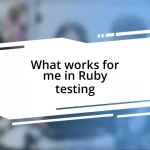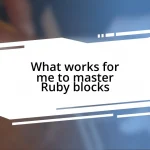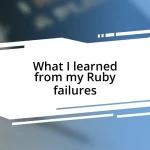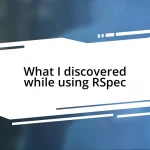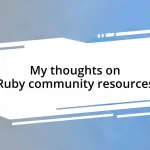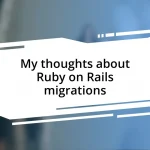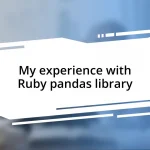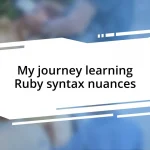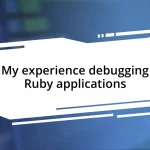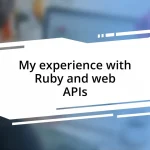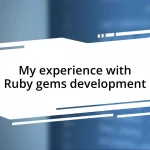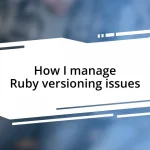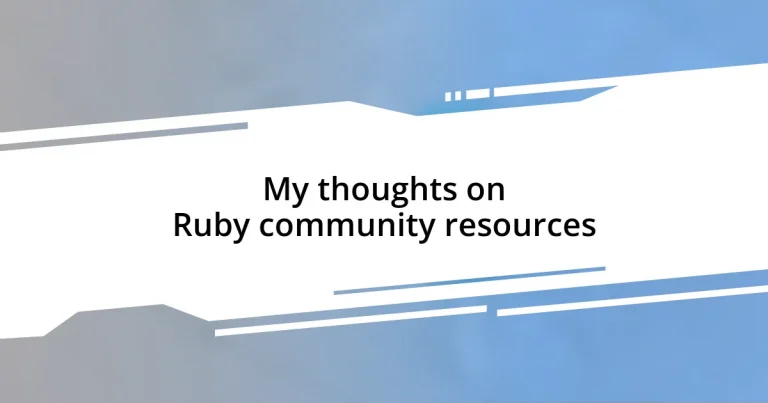Key takeaways:
- The Ruby community offers valuable resources such as forums, meetups, and mentorship programs that enhance learning and foster collaboration.
- Engaging in local meetups creates a sense of belonging and provides opportunities for networking, feedback, and project collaborations.
- Contributing to open-source projects, whether through code, documentation, or community support, empowers developers and enriches the Ruby ecosystem.
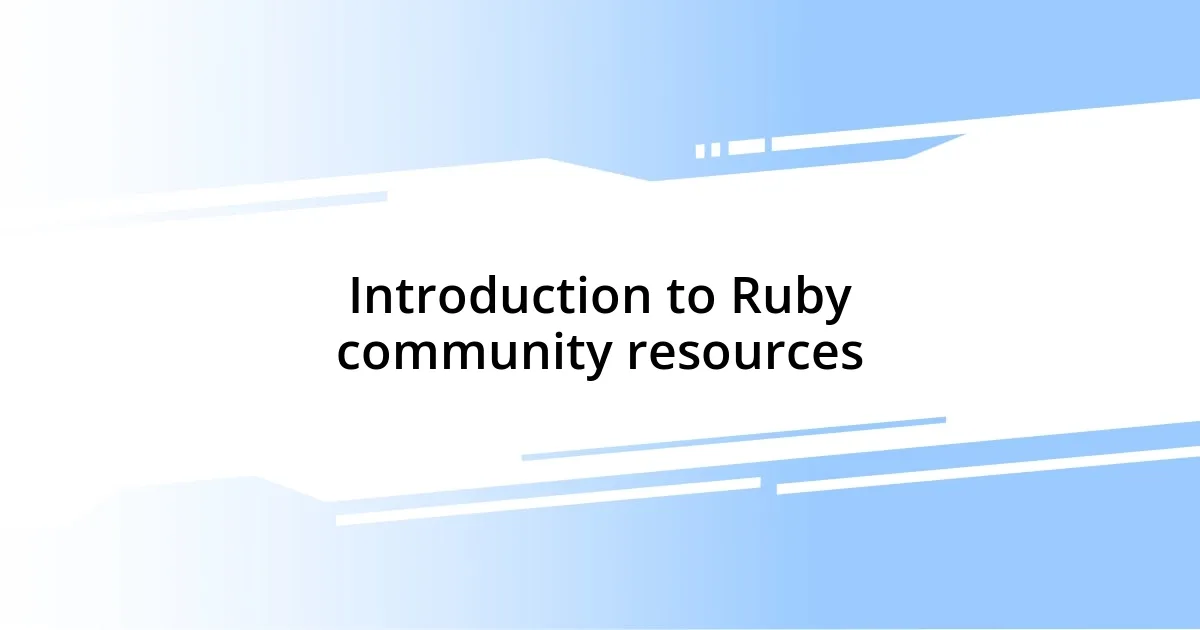
Introduction to Ruby community resources
When I first dove into the Ruby programming language, I was amazed by the vibrant community that surrounds it. I remember feeling a mix of excitement and apprehension as I sought resources, uncertain where to begin. Have you ever felt that way? It’s a common feeling, but thankfully, there are wonderful resources that make the journey smoother.
Ruby community resources are more than just documentation and forums; they are lifelines for developers at any level. For instance, I’ve found that participating in discussions on platforms like Stack Overflow has not only enhanced my coding skills but also built lasting relationships with fellow Rubyists. Isn’t it fascinating how a single question can lead to a treasure trove of knowledge and collaboration?
Perhaps what I cherish most are the meetups and conferences that bring people together to share their love for Ruby. I remember attending my first local Ruby meetup and feeling instantly welcomed. The energy in the room was infectious, as seasoned developers and newcomers alike exchanged tips and stories. It made me realize that the Ruby community isn’t just about coding; it’s about connecting with others who share a common passion. Wouldn’t you agree that these connections are what truly enrich our learning experience?
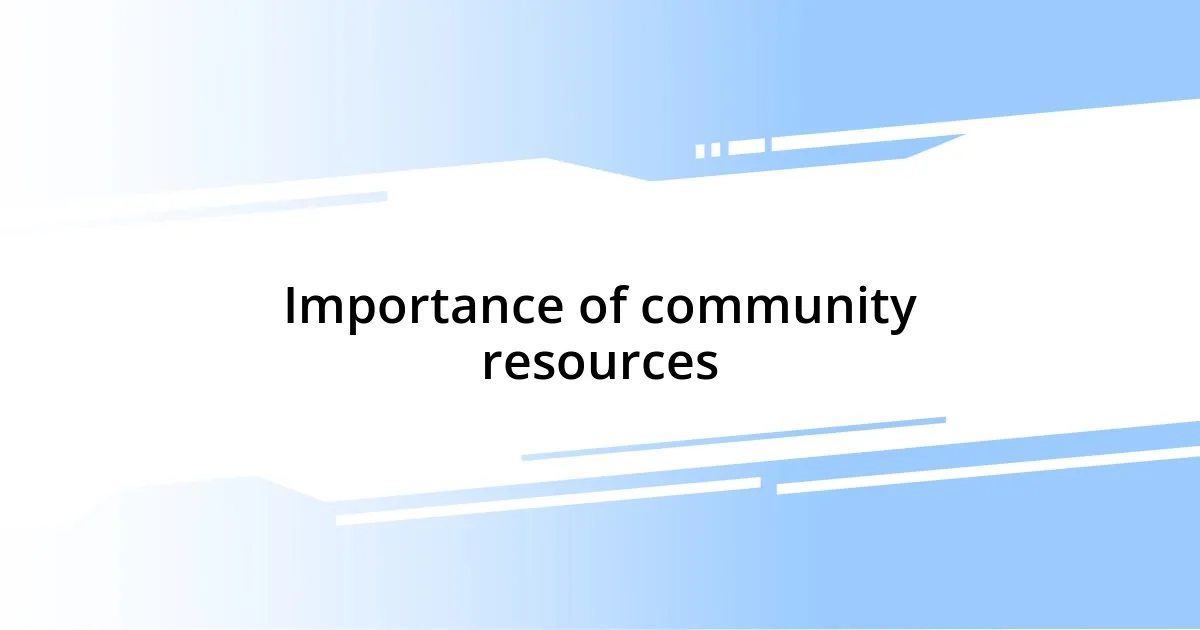
Importance of community resources
Community resources play a crucial role in the Ruby landscape. When I first started, I was often overwhelmed by the sheer amount of information available. Yet, discovering dedicated forums and mentorship programs made a significant difference; they offered not just knowledge but the guidance I desperately needed. Have you ever considered how much easier it is to learn when someone is there to support you?
Furthermore, these resources foster collaboration and innovation. I’ve seen remarkable projects come to fruition when passionate individuals shared their ideas on community boards. It’s like a creative melting pot, where everyone contributes their unique skills and experiences. I recall brainstorming a project with someone I met online, which turned into a partnership I truly value today. Don’t you see the potential for growth when like-minded people connect?
Lastly, the sense of belonging that these resources create cannot be overstated. Knowing that others are on a similar path can be incredibly motivating. I often think back to my first coding challenge hosted by a community group. The camaraderie and shared excitement sparked a fire within me, pushing me to tackle even bigger challenges. Isn’t it amazing how community can transform our learning experience and encourage us to reach new heights?
| Type of Resource | Importance |
|---|---|
| Forums | Offer support and exchange of ideas. |
| Meetups | Create connections and enhance motivation. |
| Mentorship Programs | Provide guidance and personalized learning. |
| Online Courses | Expand knowledge with structured learning. |
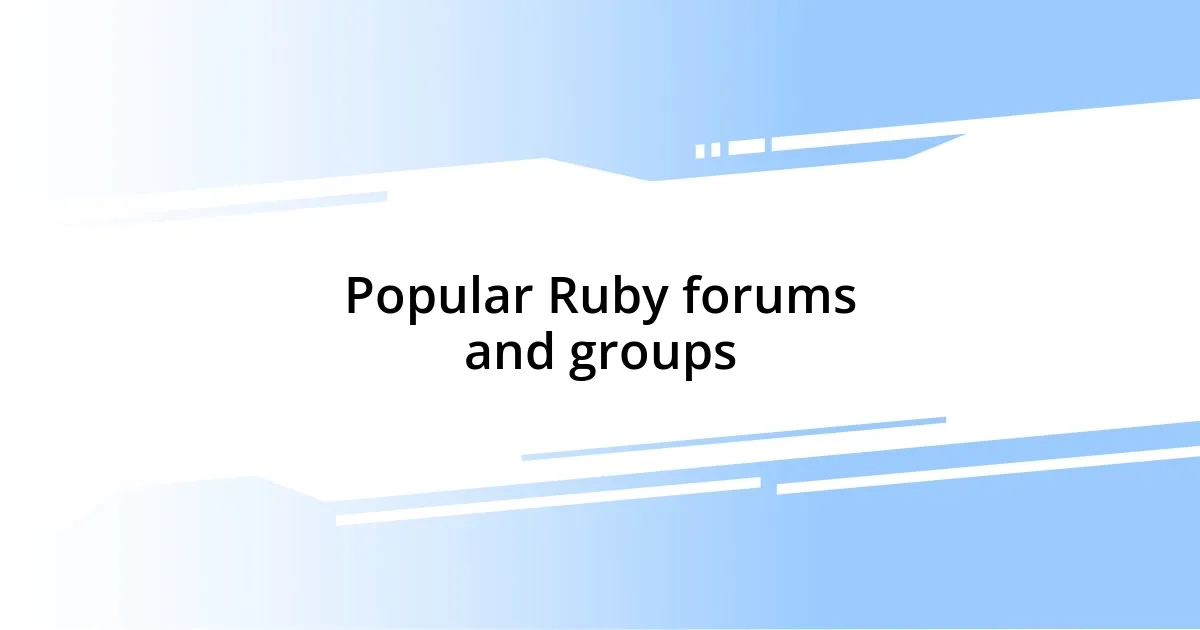
Popular Ruby forums and groups
The Ruby community is filled with exciting forums and groups where developers can engage, share, and grow together. I have often found myself wandering into Ruby-related discussions on platforms like Reddit or the Ruby Forum, where the warmth and willingness to help from seasoned members truly shine through. Just last week, I posed a question about optimizing code, and within hours, I received thoughtful responses that not only solved my problem but also sparked a new idea for a project I’m excited about. It’s moments like these that remind me how invaluable these platforms are.
Here are some of the most popular Ruby forums and groups worth checking out:
- Ruby Forum: A dedicated space for Ruby enthusiasts to discuss topics, share solutions, and ask questions.
- Reddit’s r/ruby: An engaging community where both beginners and advanced developers share articles, resources, and projects.
- Stack Overflow: An essential resource for troubleshooting and expert advice, with a wealth of Q&A specifically for Ruby.
- Ruby on Rails Link: Focused on the Rails framework, this group thrives on sharing tips, libraries, and best practices among developers.
- Ruby Meetup Groups: Local groups that host events, talks, and networking opportunities, offering a chance to meet like-minded developers.
Joining these forums and groups not only enhances your learning experience but also fosters a sense of belonging. I can’t help but feel invigorated when I join a live chat or a discussion thread; exchanging ideas with others brings a wonderful energy that fuels my passion for Ruby. It truly feels like being part of a supportive family, where everyone is excited to learn and grow alongside each other.
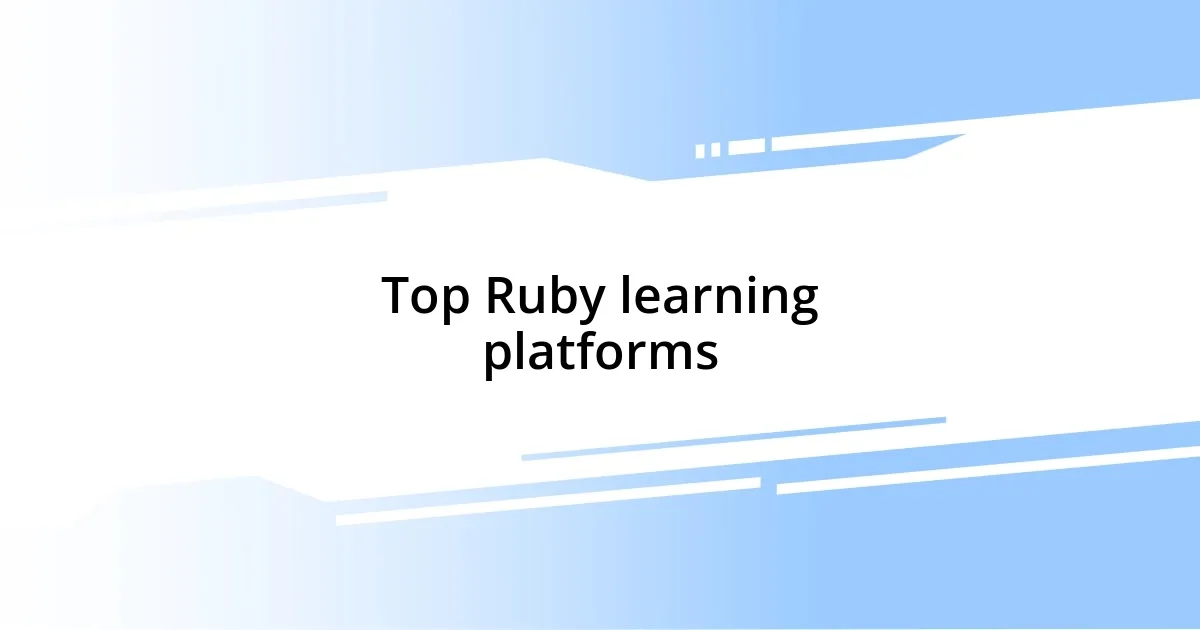
Top Ruby learning platforms
When I think about the top Ruby learning platforms, one name always comes to mind: Codecademy. I remember my own experience taking their Ruby course; it felt like diving into a well-structured curriculum that balanced theory with hands-on practice. The interactive coding environment was not only engaging but truly helped reinforce my understanding of concepts, from basic syntax to more complex object-oriented programming. Have you ever had a course feel like a game? That’s the kind of motivation Codecademy cultivates.
Another platform that stands out is RubyMonk. I recall feeling overwhelmed by Ruby’s extensive libraries, but RubyMonk broke things down into bite-sized, manageable sections. The tutorials were straightforward, and the best part? I could code right in my browser. This flexibility allowed me to learn at my own pace and revisit challenging parts until they clicked. Don’t you agree that having resources tailored to individual learning styles can make a massive difference?
Lastly, I can’t overlook the value of The Odin Project. Its free and open-source approach is both empowering and liberating. I embarked on my web development journey with their Ruby path, and it was exhilarating to connect the dots between programming and real-world applications. The community behind The Odin Project added an extra layer of accountability; sharing progress and helping others created a collaborative environment. Have you ever experienced the rush of learning alongside others who share your goals? It’s those connections that transform the learning experience into something truly special.
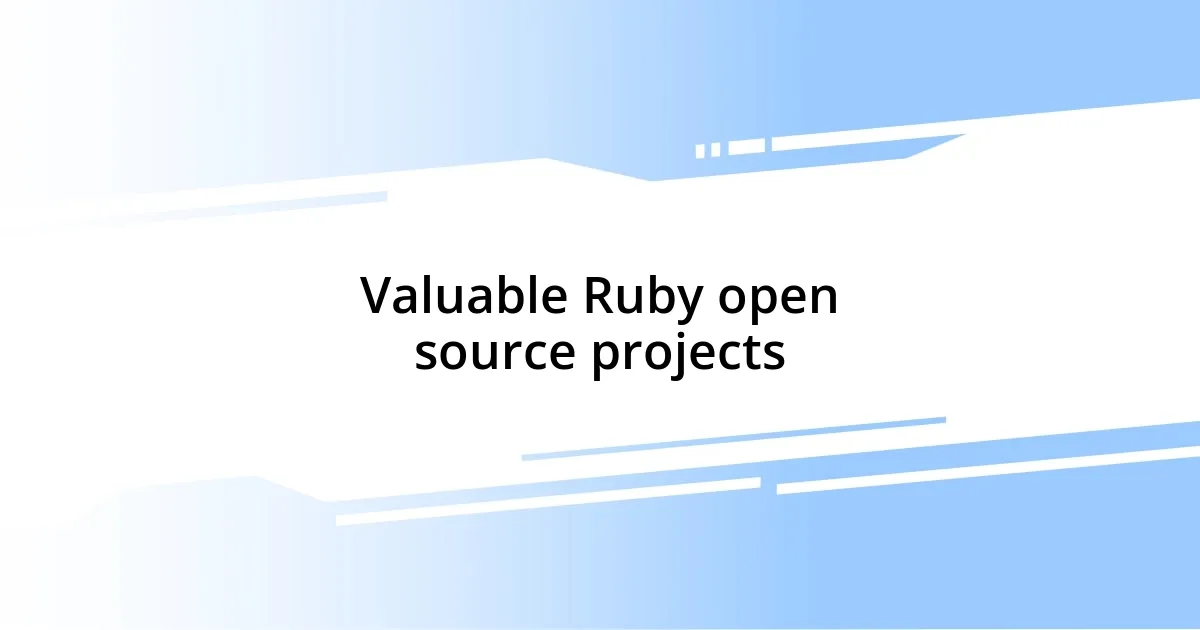
Valuable Ruby open source projects
When I explore valuable open source projects in the Ruby community, I can’t help but feel inspired by the creativity and collaboration that fuels them. One standout project is Ruby on Rails, which has been a game changer for web developers. I remember my first experience building a web application with it; the ease of convention over configuration made the process feel like a flow rather than a chore. Have you ever felt that rush when everything just clicks? That’s what Rails can do—it empowers developers to focus on building features without getting bogged down in setup.
Another gem is Homebrew, the popular package manager that simplifies the installation of software on macOS. When I first discovered it, I was amazed at how it streamlined my development environment setup. I often think back to those early days, spending hours hunting for the right dependencies. With Homebrew, I could install components with a simple command. It’s an incredible feeling to have tools at your fingertips that enhance productivity and efficiency, isn’t it?
Then there’s RSpec, the testing tool that transformed how I approach coding in Ruby. As someone who once dreaded writing tests, discovering RSpec changed my mindset completely. I distinctly recall the moment I wrote my first test with it; the clarity and readability of the syntax made me realize that testing could be both easy and enjoyable. Engaging with the community to learn best practices around RSpec has pushed my skills to a new level. Have you ever faced a challenge and found that just the right tool turned it into a stepping stone for growth? That’s the magic of these open source projects.
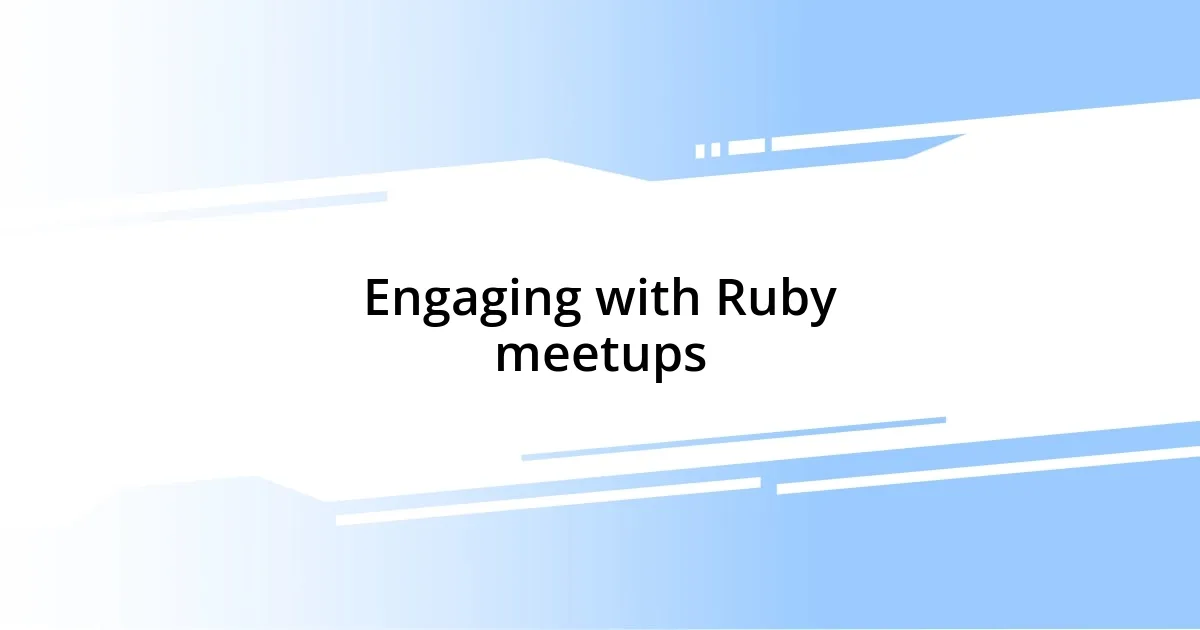
Engaging with Ruby meetups
Engaging with Ruby meetups has been a transformative experience for me. I remember attending my first meetup, where I nervously walked into a room full of strangers. However, the warmth and enthusiasm of the community quickly eased my worries, and I found myself diving into conversations about passion projects and upcoming tech trends. Have you ever felt that immediate sense of belonging when surrounded by like-minded individuals?
One of my favorite aspects of these meetups is the informal atmosphere that fosters learning and sharing. At one event, I had the chance to present a small project I was working on. It was humbling to receive constructive feedback from seasoned developers who genuinely cared about helping me grow. Their encouragement ignited a new spark in my coding journey. I often think about how sharing our experiences in a casual setting can lead to growth we might never achieve alone—don’t you think that community support is invaluable in our pursuits?
The connections I’ve formed at these gatherings have led to collaborations that I hadn’t anticipated. For instance, I teamed up with a fellow Rubyist I met at a meetup to create an open-source tool that simplifies the debugging process. That experience made me realize the immense potential that thrives in these communities—not just for learning, but for creating impactful tools together. Isn’t it amazing how a simple conversation can evolve into something so meaningful? Engaging with Ruby meetups is more than just networking; it’s about building relationships that nurture our growth as developers.
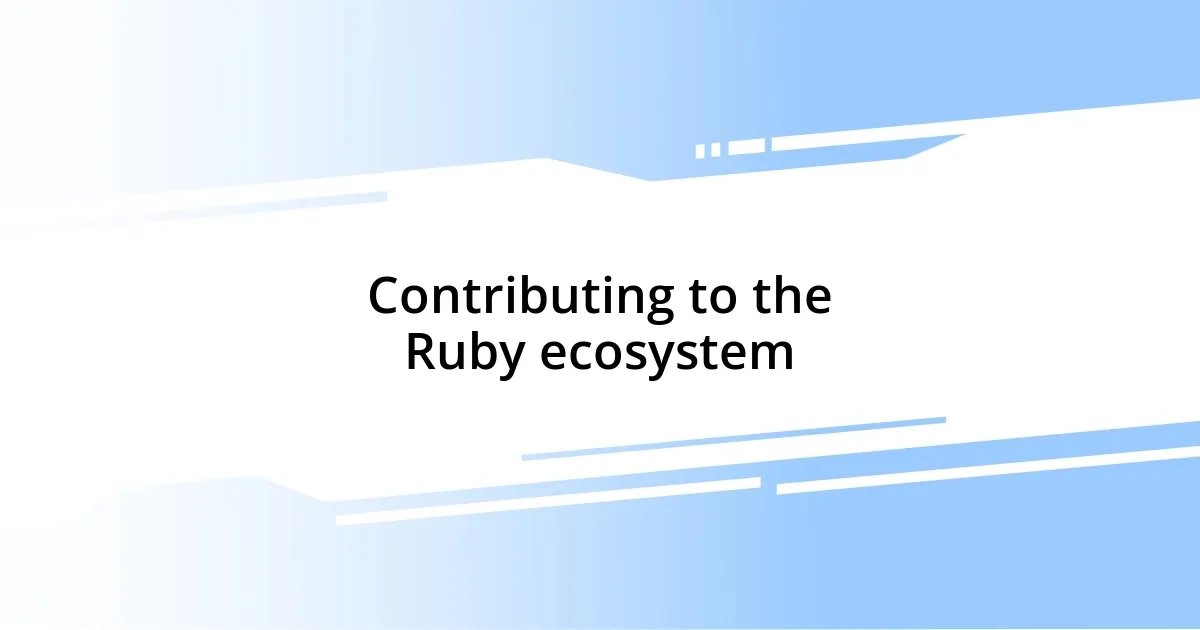
Contributing to the Ruby ecosystem
Contributing to the Ruby ecosystem can be one of the most fulfilling experiences for a developer. I vividly recall the first time I committed to an open-source Ruby project. The excitement I felt when my code was accepted into the project was palpable; it was like joining a team where every line of code opened the door to collaboration and creativity. Have you ever had that moment where you realized you were part of something bigger? That’s the essence of contributing—being part of a thriving community where your contributions can truly make a difference.
I’ve also learned that contributing isn’t just about code; it can extend to documentation, design, and even community support. I once took on the task of improving the README file for a lesser-known gem. It was surprising how such a small endeavor could create a ripple effect—more people started using it, and some even reached out with their experiences. It made me wonder: how often do we underestimate the impact of our efforts? I’m convinced that every contribution, no matter how minor it may seem, has the potential to empower others and enhance the overall ecosystem.
Another fulfilling aspect is engaging with fellow contributors during hackathons or coding sprints. I attended one recently, jumping headfirst into the collaborative atmosphere. The ideas flowed, and I often found myself enthralled by discussions with developers from different backgrounds, all unified by Ruby. That environment not only inspired me to push my limits but also ignited friendships that continue beyond the event. Have you experienced that electric feeling when minds come together to solve a problem? It’s in these moments that I realize the true heart of the Ruby community lies in its collaborative spirit, which drives continuous growth and innovation.
